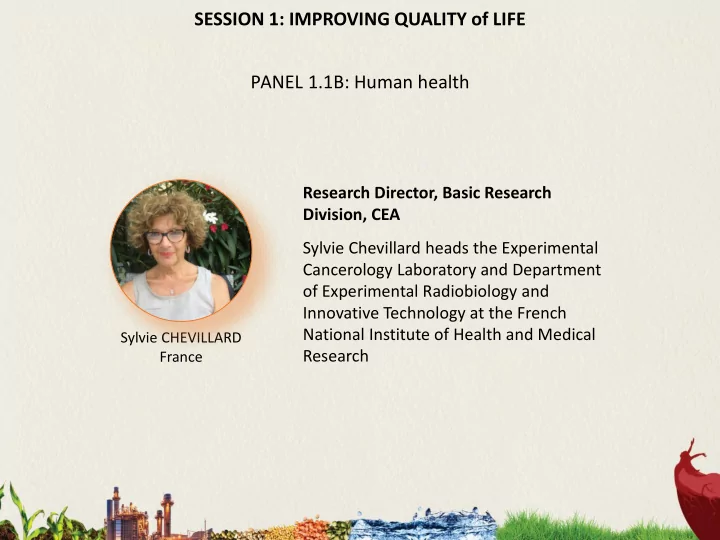

SESSION 1: IMPROVING QUALITY of LIFE PANEL 1.1B: Human health Research Director, Basic Research Division, CEA Sylvie Chevillard heads the Experimental Cancerology Laboratory and Department of Experimental Radiobiology and Innovative Technology at the French National Institute of Health and Medical Sylvie CHEVILLARD Research France
METALLIC NANOPARTICLES: PROMISING TOOLS TO ENHANCE EFFICACY AND DOSIMETRY IN RADIOTHERAPY Sylvie Chevillard BASIC RESEARCH DEPARTMENT INSTITUT OF BIOLOGY FRANÇOIS JACOB CANCEROLOGY EXPERIMENTAL UNIT CEA | 10 AVRIL 2012 | PAGE 2
Radiotherapy Patients treated by radiotherapy n > 210 000 80000 Radiotherapy a major treatment for cancer 67951 70000 • 50% of cancer patients received RX 60000 • 20% of cancer are radiation-resistant 53519 50000 Radiotherapy road map improvements Patients 41796 40000 • better target the tumor • total dose split 30000 23279 • higher dose per session 20000 • higher dose rate 14665 14234 10000 0 Breast Prostate Lung VADS Metastasis Other Main challenges National Institute of Cancer (France) 2017 • increase radiation efficacy, while preserving healthy tissues • overcome resistance and/or tumor relapse? • intratumoral radiation dosimetry rather than calculation of the delivered radiation dose - is the dose currently delivered to the tumor the expected one? … - prevent accident during the time course of radiotherapy 6 DÉCEMBRE 2018
Metallic nanoparticles for radiotherapy enhancement and intratumoral radiation dosimetry Transversal skills and technical innovations in astrophysics, biology and chemistry é é é é à ç
Principle effects of radiotherapy on cancer cells Indirect effects Direct effects Living cancer cells Resistant tumor Sensitive tumor H2O ° OH + e - ROS Dead cells Dead cells and living resistant cells 6 DÉCEMBRE 2018
Nanoparticles : enhancement of radiotherapy Direct effects Indirect effects Flurorescent emission Living cancer cells Campton scattering ROS e- High z e- ROS Auger electrons metal Sensitive and Resistant tumor e- Pair production e+ positron & electron ROS Electromagnetic scattering Dead cells Additive indirect effects
Nanoparticles enhancement of radiotherapy Nanoparticles internalisation DarkField microscopy 50µm Cancer cells Control 10µg/mL 50µg/mL MDAMB231 0µg/mL MDAMB231 50µg/mL 60 10000 50 1000 Mortality (%) 40 Number of cells 100 30 Millions 20 10 10 1 0 0 8 20 28 40 47 0.1 0 10 20 30 40 50 Days Irradiation + AuNP irradiation
Nanoparticles : intratumoral radiation dosimetry Photon detector Flurorescent Strictly emission proportional to the dose Campton scattering e- e- Auger electrons High z metal e- Pair production e+ positron & electron Electromagnetic scattering 6 DÉCEMBRE 2018
Fluorescence detection of irradiated nanoparticles intratumoral radiotherapy dosimetry Sensitivity : 50 µg 6 DÉCEMBRE 2018 | PAGE 9
Conclusions Main results • Improve efficacy of radiotherapy by killing resistant cancer cells – Better cure • Real time measurement of radiation dose delivered into the tumor – Better cure and increased safety First attempts of XRF tomographic reconstruction for adjustment of NP exposure Combine transversal skills ans knowledge Disruptive technologies are only possible through multidisciplinary approaches Still a lot of work to get to the patient, but all proofs of concept are there 6 DÉCEMBRE 2018
Thank you for your attention CEA DRF/IRFU Astrophysics Olivier Limousin, Diana Renaud, Daniel Maier, Franc̨ois Visticot, Pierre-Anne Bausson, Jêrõme Martignac CEA DRF/iRCM biology and cancer cells Sylvie Chevillard, Romain Grall, Jêrõme Lebeau, Jozo Delic, CEA DRT/LIST Robotics & tomography Hermine Lemaire, Caroline Vienne, Adrien Stolidi University Paris Sud / LCP Chemistry Cêcile Sicard, Emilie Brun, Stêphanie Droniou
Recommend
More recommend